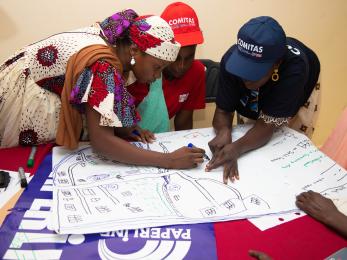Improving Nutrition with the Graduation Approach
A Technical Learning Brief

Drawing inspiration from proven programmes like BRAC's Ultra-Poor Graduation, the initiative combines social protection, financial inclusion, and livelihood development to empower impoverished households. While various organisations have adapted the Graduation Approach to diverse contexts, USAID Nawiri stands out as the first Resilience Food Security Activity addressing Persistent Acute Malnutrition. Operating in historically marginalised regions with high poverty and low human development, the programme navigates challenges such as chronic food insecurity, malnutrition, and environmental shocks. Through its four-year journey, this brief offers insights into context, early results, learning, and recommendations, showcasing programme’s commitment to driving positive nutrition outcomes in vulnerable communities.
Programme Achievements and Success Indicators
- Graduation businesses served as informal food safety nets and sources of social capital for communities, contributing to improved nutrition outcomes.
- Over 80% of participants with food businesses obtained food from their own businesses, enhancing food security and economic empowerment.
- Promising trends in health-seeking behavior, with increased access to crucial preventive interventions and a significant decline in diarrhea incidence among children of Graduation participants.
- Graduation savings groups supporting effective layering of nutrition components, promoting resilience, and sustainability through savings accumulation and productive use of credit .
- Graduation businesses facilitating access to nutritious food in remote rural communities, activating last-mile markets, and promoting consumption of healthier food options .
- Leveraging the Graduation Approach as a transition pathway into and out of emergency response, providing entry and exit points for emergency cash transfers and market engagements.
- Plans to conduct post-graduation evaluations to assess sustainability, post-graduation shocks, and the long-term impact of Graduation transition pathways on poverty reduction and nutrition outcomes.
- Implementation of two variations of the Poverty Graduation Approach, ANGM and R4N, tailored to address the immediate, underlying, and basic causes of Persistent Acute Malnutrition (PAM) in different counties.
Learning and Adaptations:
- Targeting Graduation for nutrition is complex and must account for the possibility of perverse incentives.
- Market saturation by Graduation businesses is a risk determined by numerous contextual factors that requires deeper exploration.
- Engagement of whole households enhances nutrition practices, but the programme must attend to mixed trends in women’s time use.
- Graduation dukas serve as informal food safety nets for their owners and communities, and sources of social capital for their owners.
- USAID Nawiri is refining what successful graduation from poverty and malnutrition in shock-prone ASALs looks like, including where sustainability requires additional investments.


